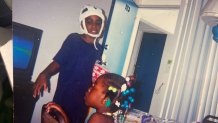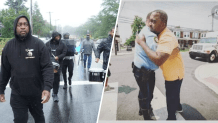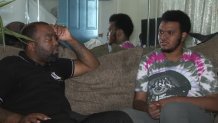An out-of-body experience
Monday, April 3, 2000, was a normal day for 10-year-old Oronde McClain. He was standing outside a Chinese restaurant on Chew Avenue and Sharpnack Street in Philadelphia's East Mount Airy neighborhood, waiting for the Route 18 SEPTA bus.
“You know if you’re from Philly, SEPTA is always late or always early. It’s never on time,” McClain said. “So I looked and it wasn’t coming.”
When I was laying there in my own pool of blood, I died for two minutes and 17 seconds.
Oronde McClain
Suddenly, he heard gunshots. McClain raced toward the restaurant and tried to get inside, but the door was locked.
A bullet then struck him in the back of the head.
“When I was laying there in my own pool of blood, I died for two minutes and 17 seconds,” McClain said. “And I had this, like, out-of-body experience.”
McClain remembers climbing a ladder while feeling invincible.
“Nothing could stop me,” he said. “And somebody was pulling my leg. And I’m like, ‘Get off the leg.’ I’m trying to hurry up and hurry up. And somebody actually grabbed my leg.”
McClain then woke up after what felt like 20 to 30 seconds. It turns out however, that he had been in a coma for seven weeks. His recovery was grueling, both physically and mentally.
“I had to learn how to walk, talk, all over again. I used to be right-handed. Now I’m left-handed,” McClain said. “I had to learn English over, because my first words [when I awakened from the coma] were in Latin.”
McClain didn’t know he had been shot. Instead, he was told that he had been hit by a car. It wasn’t until he was watching a report on the local TV news that he realized the truth.
“It said, ‘Boy shot in the head. Ten-years-old.’ And my face popped up,” McClain said. “This is the first time I found out I was on the news and I got shot. Thirty seconds later I had my first seizure. Because I remembered everything that happened.”
McClain said he attempted suicide at least 23 times during his recovery, which spanned several years. He wanted to return to that ladder he was climbing moments after the shooting. But he could never get back there.
“My last suicide attempt, I said, ‘You know what? I shouldn’t be doing this,’” McClain said. “I’m here for a purpose.’”

Finding a purpose
That purpose became clear when McClain was 13 and at a church service with his grandmother.
“My grandma wanted me to speak in front of the church and tell everybody how I was doing,” McClain said. “And I stood up out of the wheelchair and I did it. And I was like, ‘This feels good.’ Everybody’s clapping and everything and I’m like, ‘You know what? This can be a thing for me.’”
McClain graduated from the University of Phoenix and earned a bachelor's degree in criminal behavior. He also wrote a book about his experience titled, "PTSD Won't Define Me."
Along with his personal growth, McClain also worked to improve the community around him. It started with a book bag drive he organized at a Philadelphia school. It then evolved into an effort to help other survivors of gun violence.
“You have all these institutions. All these nonprofits. But it’s nothing for survivors,” he said. “So when I got out of the hospital, they said, ‘OK, you’re better now. Let’s go.’ And it’s like, I’m really not better.”
McClain began working as an advocate for gun violence victims, speaking at schools and discussing solutions with local politicians.
Having important conversations was only the beginning.
In 2020, McClain founded the McClain Foundation, a nonprofit organization that provides support for victims of gun violence and their families throughout Philadelphia. That support includes medical assistance for victims as well as partnerships with local organizations advocating for gun safety.
Remembering the trauma he experienced after watching the report of his own shooting, McClain also began working with newsrooms across the city to improve their coverage of the gun violence crisis.
“Harmful reporting is bad for survivors,” he said. “And journalists and all that, they don’t understand that. They’re just trying to do their job. They get something and be like, ‘Listen, go cover this story.’ But they don’t really know, it’s traumatizing to us.”
So I go around to different newsrooms and tell them, ‘Listen, you have to take that down. I don’t think you should do this. This is not a bad idea. This is not a good idea.’ And they really listen to survivors.
Oronde McClain
McClain became a newsroom liaison for the Philadelphia Center for Gun Violence Reporting, an organization that identifies harmful reporting practices and teaches the media the best ways to cover gun violence.
“It’s a lot of harmful things on the news that triggers everybody,” McClain said. “So I go around to different newsrooms and tell them, ‘Listen, you have to take that down. I don’t think you should do this. This is not a bad idea. This is not a good idea.’ And they really listen to survivors.”
McClain’s work has connected him to many survivors, including Dashawn Walker.

Dashawn Walker's story
Feb. 21, 2023, was an exciting day for Walker. The 17-year-old was on the phone with his mother while walking home from school.
“I got accepted to a college that day so I’m like hype, on the phone with my mom,” Walker said.
Walker and a 13-year-old girl were walking on Uber Street and Montgomery Avenue in Philadelphia around 3:30 p.m. that day. Suddenly, a 2012 grey Nissan Maxima pulled up next to them, according to investigators.
Police said a masked man in black clothing then jumped out of the passenger side of the car, pulled out a gun and opened fire.
The teen girl was grazed in the arm. Walker, meanwhile, was shot 10 times.
“Five in the right leg, four in the left leg and one in the chest,” he said.
Both Walker and the teen girl were taken to the hospital. The girl was placed in stable condition while Walker was critically injured.
Walker said his physical recovery took about two months. His mental recovery is ongoing however.
“I was angry,” Walker said. “I felt like I had something going on for myself. I was angry because I feel like I let somebody stop my career. Another human being.”
Even though he was the victim of the shooting, Walker said he was still banned from his school’s prom, graduation and other activities.
Angry and emotionally scarred, Walker was introduced to McClain and his program through a local reporter.
And then I said I wanna deal with somebody that’s already been shot before. That went through something that I went through.
Dashawn Walker
“I wasn’t interested at first,” Walker said. “And then I said I wanna deal with somebody that’s already been shot before. That went through something that I went through. And then I talked to him and then he helped me ever since.”
Bonded by their trauma, McClain served as a mentor for Walker while also aiding in his recovery.
“I asked him, 'How did [you] get through it? Like, what did you do to get through it?' And he told me what he did and then he gave me a book,” Walker said. “A PTSD book. And then when I read it, it just helped me.”
While McClain has helped Walker tremendously, the now 18-year-old said he still feels the lingering effects of the shooting.
“I don’t like coming outside,” Walker said. “Normal stuff that people should not have to be scared of. I’m working on a thing right now, called trusting people. Because when you get shot, you look at everybody different.”
Throughout all of Walker’s struggles, McClain has been with him every step of the way.
“I call him on days that he’s off,” Walker said. “Like, ‘I need your advice on this. I need this. I need that. I need your advice with XYZ or a decision.’”
McClain’s advocacy also inspired Walker to pay it forward.
“I wanted to start my own organization called, ‘The Redemption Organization’ to help others,” Walker said. “I think it can help others my age. I didn’t think I was this strong to get through the stuff that I got through.”
Walker told NBC10 he plans on attending the Community College of Philadelphia in the fall as he continues on his road to recovery.

A second chance
Walker is one of several teens that McClain has mentored. Through his foundation, McClain launched the Social Impact Project. Using a $100,000 state grant, the program takes in Philadelphia-area teenagers between the ages of 14 and 18 who are serving sentences for various offenses. If the teens successfully complete the program, their records are expunged.

One participant in the program is 18-year-old Kaseem Scott-Ransome, who told NBC10 he was arrested for armed robbery in August of 2022.
“I’m not poor or homeless or nothing like that, I just wanted some money in my pocket, you know and, my mom wanted me to work for it and at the time I was being lazy,” Scott-Ransome said. “I wasn’t looking for a job so I thought picking up a gun would make it easier and better, but it was a mistake.”
For somebody just to come in like, ‘Yeah, I got shot at this age,’ and just to break that down to us and then show us how he overcame it, that makes me want to do something with my life.
Kaseem Scott-Ransome
After being on house arrest and spending time in a juvenile detention center, Scott-Ransome received a second chance through McClain’s program.
The teen said McClain’s mentorship and story have inspired him to turn his life around.
“For somebody just to come in like, ‘Yeah, I got shot at this age,’ and just to break that down to us and then show us how he overcame it, that makes me want to do something with my life,” Scott-Ransome said.
Oronde's message
Today, Oronde McClain is a 33-year-old husband and father of five. Yet he still bears the scars of that fateful day on April 3, 2000. His gunshot wound is still visible. He’s still partially paralyzed on his right side. He still needs help putting on his shoes.
I'm glad that I got shot in the head because I'm helping everybody now.
Oronde McClain
As he sat across the street from the same restaurant where he was shot more than two decades ago, McClain insisted he wouldn't change anything that happened to him.
“I’m glad that I got shot in the head because I’m helping everybody now,” he said. “I wouldn’t have been helping nobody because I would’ve been minding my business.”
The identity of McClain's shooter remains a mystery. Regardless of who the culprit is (or was), McClain doesn't hold any anger toward the person responsible.
“Listen, thank you. You helped me,” McClain said. “And I don’t want nothing bad to happen to you. I want you to understand that I’m happy. I found myself. And I want you to live your life. Don’t worry about me. Don’t feel like, ‘Oh, I shot this little boy.’ This little boy died. He died over there for two minutes and seventeen seconds. That little boy is gone. Now you’ve got this grown man that’s helping the city. That’s trying to help the world."

